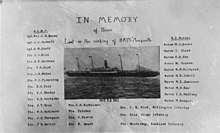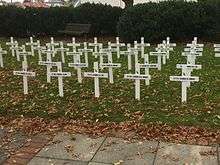SS Marquette (1897)
SS Marquette was a British troopship of 7,057 tons which was torpedoed and sunk in the Aegean Sea 36 nautical miles (67 km) south of Salonica, Greece on 23 October 1915 by SM U-35, with the loss of 167 lives.[1][2]
.jpg) SS Marquette | |
| History | |
|---|---|
| Name: |
|
| Owner: |
|
| Operator: |
|
| Port of registry: | London |
| Builder: | Alexander Stephen and Sons, Glasgow |
| Yard number: | 373 |
| Launched: | 25 November 1897 |
| Identification: |
|
| Fate: | Torpedoed and sunk on 23 October 1915 |
| General characteristics | |
| Class and type: | Cargo steamship |
| Tonnage: | 7,057 GRT |
| Length: | 486 ft 6 in (148.29 m) |
| Beam: | 52 ft 4 in (15.95 m) |
| Decks: |
|
| Installed power: | 770 nominal horsepower |
| Propulsion: |
|
| Speed: | 14 knots (26 km/h) |
| Range: | Bunker capacity: 1,100 tons |
The ship was originally planned as SS Boadicea, for the Wilson and Furness-Leyland Line, but was acquired by the Atlantic Transport Line shortly after completion to replace ships requisitioned during the Spanish–American War. She made a single voyage under the name Boadicea, and was renamed Marquette on 15 September 1898.
The sinking of Marquette
On 19 October 1915 the ship departed from Alexandria, Egypt, destined for Salonika (now Thessalonika) in Greece.[3] The total ship's complement was 741: 95 crew, 6 Egyptians, the No 1 Stationary Hospital (36 nurses, 12 officers and 143 other ranks), and the Ammunition Column of the British 29th Division (10 officers and 439 other ranks). There were also 491 mules and 50 horses on board.[4] Captain John Bell Findlay (born 1853 in Montrose, Scotland; died Essex 1938) was Master.[5]
On leaving Alexandria, the ship was accompanied by a French destroyer escort, however the escort left Marquette on the night of 22 October. At 9.15 a.m. on 23 October, the ship was hit by a torpedo on the starboard side and immediately listed to port.[6] Some on board were killed by the explosion, while others were killed by lifeboats which were inexpertly launched - one, for example, fell onto another which was already in the water.[7] The ship sank within ten minutes, with nurses, soldiers and crew still on board. Many survivors died in the water while waiting to be rescued.[7]
The Stationary Hospital had been allocated to a troop ship by the British authorities, despite the empty British hospital ship Grantully Castle having sailed on the same route on the same day from Egypt to the northern Greek port of Thessaloniki. The loss of nurses and medical staff led to the New Zealand government asking the War Office (via the Governor, Lord Liverpool) in November 1915 that transfers of medical staff be done by hospital ships where possible[8] Subsequent voyages of the 1st New Zealand Stationary Hospital were made in hospital ships.[9]
Survivors
Survivors were rescued about seven hours after the sinking by British ships HMHS Grantully Castle and HMS Lynn, and the French ships Mortier and Tirailleur.[3][7] The surviving members of the Stationary Hospital sailed from Salonika back to Alexandria on 29 October, on the hospital ship HMHS Grantully Castle, and continued to serve for the remainder of the war.[7] Survivors included New Zealanders surgeon Hugh Acland and nurses Minnie Jeffery, Mary Looney and Jean Erwin.

Casualties

29 crew, 10 nurses and 128 troops died in the sinking.[4] 32 of the dead were New Zealand nationals: 19 from the Royal New Zealand Army Medical Corps, 3 privates (medical orderlies) attached to the Stationary Hospital and 10 nurses from the Royal New Zealand Army Nursing Service.[10][11] Casualties included:
- Private Geoffrey Baker[12]
- Staff Nurse Marion Brown
- Staff Nurse Isabel Clark
- Staff Nurse Catherine Fox
- Staff Nurse Mary Gorman
- Staff Nurse Nona Hildyard
- Staff Nurse Helena Isdell
- Staff Nurse Mabel Jamieson
- Private Clarence Perrin[13]
- Private Roland Pole[14]
- Staff Nurse Mary Rae
- Staff Nurse Lorna Rattray
- Staff Nurse Margaret Rogers
- Private John Walter[15]
Aftermath
A naval Court of Enquiry into the sinking was held on the protected cruiser HMS Talbot in Salonika Harbour on 26 October. The report, dated 3 November, found that no-one was at fault.[16]
The sinking and the deaths of ten New Zealand nurses caused public outrage in New Zealand, particularly in the South Island where most of the nurses had come from. The deaths were used in propaganda to encourage men to recruit for the war. Medical staff had not needed to be on the troop transport ship, as a marked hospital ship had left the same port on the same day and would in theory have been safe from attack. In November 1915, New Zealand's governor Lord Liverpool requested future transfers of medical personnel be done by hospital ships if possible.[17]
Discovery of the shipwreck
In 2009, the wreck of Marquette was located and verified by divers. The ship lies in 90 metres (300 ft) of water approximately 14 miles (23 km) off the shore of Greece, in the Thermaikos Gulf.[18][19] The British Embassy in Greece issued a protection order over the wreck.[7]
Memorials
The names of the dead are recorded in the Mikra British Cemetery in Greece.[20]
The Nurses' Memorial Chapel at Christchurch Hospital in New Zealand commemorates the three Christchurch nurses who drowned.[21]
In October 2015, on the centenary of the sinking, memorial events were held in New Zealand. In Christchurch a historical display, a memorial service and a lecture were held and St Margaret's College performed a stage play based on the Marquette story, "Roses of No Man's Land".[22][23][24] In Waimate, a memorial service was held and a commemorative plaque was unveiled.[25]
Notes
- "British Merchant Ships Lost to Enemy Action Part 1 of 3 – Years 1914, 1915, 1916 in date order". Naval History. Retrieved 21 January 2013.
- Helgason, Guðmundur. "Ships hit during WWI: Marquette". German and Austrian U-boats of World War I - Kaiserliche Marine - Uboat.net. Retrieved 2 October 2012.
- "The Marquette Sinking Centenary | New Zealand Wargraves Project". www.nzwargraves.org.nz. Retrieved 27 June 2016.
- Smith 1990, p. 191.
- Smith 1990, p. 116-120.
- "Nursing Review: New Zealand's Latest Nursing News on, Health, Education, Nursing, Clinical, Mental health, Aged care, Maori health, Enrolled nursing and Professional development". www.nursingreview.co.nz. Retrieved 2 July 2016.
- "HM Troopship Marquette | World War One - The War At Sea". navymuseum.co.nz. Retrieved 2 July 2016.
- Anniversary of sinking
- Smith 1990, p. 190.
- Smith 1990, p. 9.
- Photo of memorial postcard with names
- "3/6 Pvte. Geoffrey Hugh Baker. Drowned with torpedoing of H.S. "Marquette" in Gulf of Salonika, 23/10/15 | NZETC". nzetc.victoria.ac.nz. Retrieved 2 July 2016.
- "3/31 Pvte. Clarence Perrin. Drowned through torpedoing of H.S. "Marquette," Gulf of Salonika, 23/10/15 | NZETC". nzetc.victoria.ac.nz. Retrieved 2 July 2016.
- "3/59 Pvte. Roland Alfred Pole. Drowned through torpedoing of H.S. "Marquette," Gulf of Salonika, 23/10/15 | NZETC". nzetc.victoria.ac.nz. Retrieved 2 July 2016.
- "3/39 Pvte. John Bruno Walter. Drowned through torpedoing of H.S. "Marquette," Gulf of Salonika, 23/10/15 | NZETC". nzetc.victoria.ac.nz. Retrieved 2 July 2016.
- Smith 1990, p. 127–189.
- "New Zealand nurses lost in Marquette sinking". nzhistory.govt.nz. Retrieved 15 January 2020.
- info[at]paramana[dot]com, paramana.com -. "HMT Marquette | wreckDiving". www.wreckdiving.gr. Retrieved 2 July 2016.
- "Marquette wreck discovery 'moving'". Stuff.co.nz. 6 November 2009. Retrieved 2 July 2016.
- "The Marquette Sinking Centenary | New Zealand Wargraves Project". www.nzwargraves.org.nz. Retrieved 1 July 2016.
- "Nurses' Memorial Chapel". Register of Historic Places. Heritage New Zealand. Retrieved 5 March 2016.
- "2015 Marquette Commemorative Events – Christchurch Hospital Nurses Memorial Chapel". cnmc.org.nz. Retrieved 1 July 2016.
- "Christchurch exhibition - Remembering the Nurses of the Marquette | WW100 New Zealand". ww100.govt.nz. Retrieved 1 July 2016.
- "Marquette Centennial Memorial Service for Nurses | The Governor-General of New Zealand Te Kawana Tianara o Aotearoa". gg.govt.nz. Retrieved 1 July 2016.
- "Marquette commemorated". Stuff. Retrieved 1 July 2016.
References
- Smith, J M (1990). Cloud over Marquette. Auckland, NZ. ISBN 0-473-01081-X.CS1 maint: ref=harv (link)